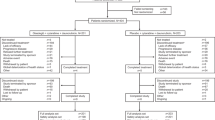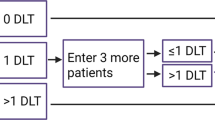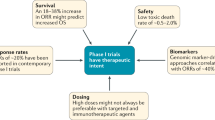Abstract
The failure of many cytostatic agents in Phase III clinical trials for treatment of common cancers has led researchers to question current approaches to trial development. Recent studies offer some clues as to what is wrong with two particular aspects of clinical trial design — survival as an end point and simultaneous combination with cytotoxic chemotherapy — and indicate possible alternatives.
This is a preview of subscription content, access via your institution
Access options
Subscribe to this journal
Receive 12 print issues and online access
$209.00 per year
only $17.42 per issue
Buy this article
- Purchase on Springer Link
- Instant access to full article PDF
Prices may be subject to local taxes which are calculated during checkout

Similar content being viewed by others
References
Nemunaitis, J. et al. Combined analysis of studies of the effects of the matrix metalloproteinase inhibitor marimastat on serum tumor markers in advanced cancer: selection of a biologically active and tolerable dose for longer-term studies. Clin. Cancer Res. 4, 1101–1109 (1998).
Ravdin, P. et al. Phase II trial of docetaxel in advanced anthracycline-resistant or anthracenedione-resistant breast cancer. J. Clin. Oncol. 13, 2879–2885 (1995).
ten Bokkel Huinink, W. W. et al. Topotecan versus paclitaxel for the treatment of recurrent epithelial ovarian cancer. J. Clin. Oncol. 15, 2183–2193 (1997).
Burris, H. A. et al. Improvements in survival and clinical benefit with gemcitabine as first-line therapy for patients with advanced pancreas cancer: a randomized trial. J. Clin. Oncol. 15, 2403–2413 (1997).
Van den Abbeele, A., & Badawi, R. Use of positron emission tomography in oncology and its potential role to assess response to imatinib mesylate therapy in gastrointestinal stromal tumors (GISTs). Eur. J. Cancer 38, 60–65 (2002).
Drevs, J. et al. Surrogate markers for the assessment of biological activity of the VEGF-receptor inhibitor PTK787/ZK 222584 (PTK/ZK) in two clinical phase I trials. Am. Soc. Clin. Oncol. A337 (2002).
Slamon, D. et al. Use of chemotherapy plus a monoclonal antibody against HER2 for metastatic breast cancer that overexpresses HER2. N. Engl. J. Med. 344, 783–792 (2001).
Mouridsen H. et al. Phase III study of letrozole versus tamoxifen as first-line therapy of advanced breast cancer in postmenopausal women: analysis of survival and update of efficacy from the International Letrozole Breast Cancer Group. J. Clin. Oncol. 21, 2101–2109 (2003).
The ICON group. Paclitaxel plus carboplatin versus standard chemotherapy with either single-agent carboplatin or cyclophosphamide, doxorubicin, and cisplatin in women with ovarian cancer: the ICON3 randomised trial. Lancet 360, 505–515 (2002).
Sirotnak, F. et al. Efficacy of cytotoxic agents against human tumor xenografts is markedly enhanced by coadministration of ZD1839 (Iressa), an inhibitor of EGFR tyrosine kinase1. Clin. Cancer Res. 6, 4885–4892 (2000).
Pollack, V. A. et al. Inhibition of epidermal growth factor receptor-associated tyrosine phosphorylation in human carcinomas with CP-358,774: dynamics of receptor inhibition in situ and antitumor effects in athymic mice. J. Pharmacol. Exp. Ther. 291, 739–748 (1999).
Albain, K. et al. Adjuvant chemohormonal therapy for primary breast cancer should be sequential instead of concurrent: initial results from intergroup trial 0100 (swog–8814). Am. Soc. Clin. Oncol. A143 (2002).
Garratt, A. et al. ErbB2 pathways in heart and neural disease. Trends Cardiovasc. Med. 13, 80–86 (2003).
A phase III clinical trial of ZD1839 ('Iressa') in combination with gemcitabine and cisplatin in chemotherapy naive patients with advanced non-small-cell lung cancer (INTACT 1) Ann. Onc. 13 (suppl. 5), 2 (2002)
Kuenen, B. et al. Dose-finding and pharmacokinetic study of cisplatin, gemcitabine, and SU5416 in patients with solid tumors. J. Clin. Oncol. 20, 1657–1667 (2002).
Demetri, G. et al. Efficacy and safety of imatinib mesylate in advanced gastrointestinal stromal tumors. N. Engl. J. Med. 347, 472–479 (2002).
Heinrich, M. et al. PDGFRA activating mutations in gastrointestinal stromal tumors. Science 299, 708–710 (2003).
Rubin, B. et al. Molecular targeting of platelet-derived growth factor B by imatinib mesylate in a patient with dermatofibrosarcoma protuberans. J. Clin. Oncol. 20, 3586–3591 (2002).
Betensky, R. et al. Influence of unrecognised molecular heterogeneity on randomised clinical trials. J. Clin. Oncol. 20, 2495–2499 (2002).
Van de Vijver, M. J. et al. A gene expression signature as a predictor of survival in breast cancer. N. Engl. J. Med. 347, 1999–2009 (2002).
Rosner, G. et al. Randomized discontinuation design: application to cytostatic antineoplastic agents. J. Clin. Oncol. 20, 4478–4484 (2002).
Johnson, J. et al. End points and United States Food and Drug Administration of Oncology Drugs. J. Clin. Oncol. 21, 1404–1411 (2003).
Saltz, L. B. et al. Irinotecan plus fluorouracil and leucovorin for metastatic colorectal cancer. N. Engl. J. Med. 343, 905–914 (2000).
Van Cutsem, E. et al. Oral capecitabine compared with intravenous fluorouracil plus leucovorin in patients with metastatic colorectal cancer: results of a large phase III study. J. Clin. Oncol. 19, 4093–4096 (2001).
Berenson, J. Z. Zoledronic acid in cancer patients with bone metastases: results of Phase I and II trials. Semin. Oncol. 28, 25–34 (2001).
Menssen, D. H. et al. Effects of long-term intravenous ibandronate therapy on skeletal-related events, survival, and bone resorption markers in patients with advanced multiple myeloma. J. Clin. Oncol. 20, 2353–2359 (2002).
Albanell, J. et al. pharmacodynamic studies of the epidermal growth factor receptor inhibitor ZD1839 in skin from cancer patients: histopathologic and molecular consequences of receptor inhibition. J. Clin. Oncol. 20, 110–124 (2002).
Lockhart, A. et al. Reduction of wound angiogenesis in patients treated with BMS-275291, a broad spectrum matrix metalloproteinase inhibitor. Clin. Cancer Res. 9, 586–593 (2003).
Schiller, J. et al. Comparison of four chemotherapy regimens for advanced non-small cell lung cancer. N. Engl. J. Med. 346, 92–98 (2002).
Hurwitz, H. I. et al. Antiangiogenic therapy plus IFL improves survival for patients with metastatic colorectal cancer. Am. Soc. Clin. Oncol. A3646 (2003).
Author information
Authors and Affiliations
Corresponding author
Related links
Related links
DATABASES
Cancer.gov
LocusLink
Glossary
- BAYESIAN STATISTICAL METHODS
-
Statistical methods in which expectation and ongoing observation are used to increase efficiency and reduce the number of observations (patient numbers) that are necessary to reach reliable conclusions. These are particularly efficient compared with 'frequentist' statistical approaches when multiple decisions are necessary — for example, in dose comparisons.
- OVERALL SURVIVAL
-
The duration for which a patient with cancer survives after the start of treatment.
- PROGRESSION-FREE SURVIVAL
-
The duration for which a patient with cancer survives after the start of treatment without evidence of disease progression.
- SURROGATE END-POINT
-
A biomarker that is used to monitor disease progression and expected to predict clinical benefit based on epidemiological, therapeutic, pathophysiological or other scientific evidence.
Rights and permissions
About this article
Cite this article
Millar, A., Lynch, K. Rethinking clinical trials for cytostatic drugs. Nat Rev Cancer 3, 540–545 (2003). https://doi.org/10.1038/nrc1124
Issue Date:
DOI: https://doi.org/10.1038/nrc1124
This article is cited by
-
SMARCA4-inactivating mutations increase sensitivity to Aurora kinase A inhibitor VX-680 in non-small cell lung cancers
Nature Communications (2017)
-
A high-content image-based method for quantitatively studying context-dependent cell population dynamics
Scientific Reports (2016)
-
A method for optimizing dosage regimens in oncology by visualizing the safety and efficacy response surface: analysis of inotuzumab ozogamicin
Cancer Chemotherapy and Pharmacology (2016)
-
On/off-switchable anti-neoplastic nanoarchitecture
Scientific Reports (2015)
-
A threshold mechanism mediates p53 cell fate decision between growth arrest and apoptosis
Cell Death & Differentiation (2013)



